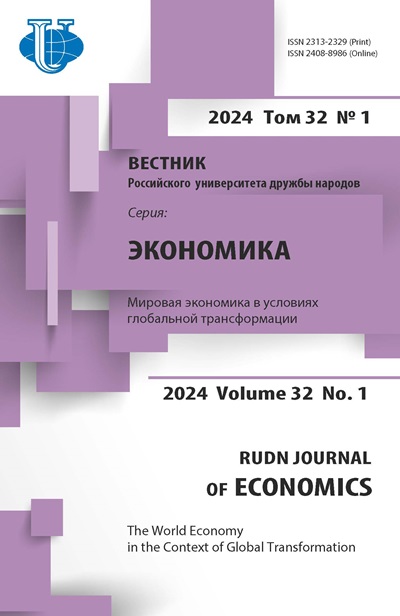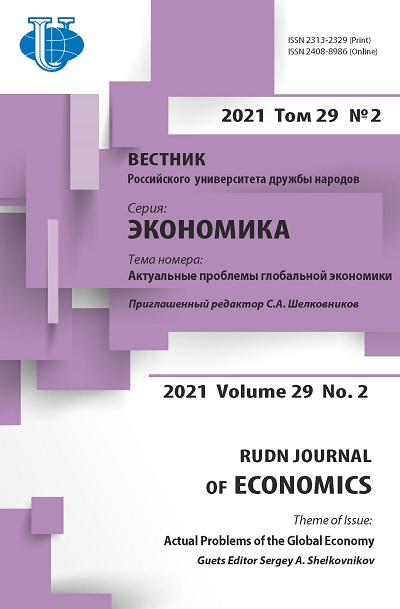Estimating the oil revenues of Iran premised on the US - Iran relationship analysis
- Authors: Sineok M.N.1, Gribanich V.M.1
-
Affiliations:
- Diplomatic Academy of the Russian Foreign Ministry
- Issue: Vol 29, No 2 (2021): ACTUAL PROBLEMS OF THE GLOBAL ECONOMY
- Pages: 451-462
- Section: Developed and developing countries economy
- URL: https://journals.rudn.ru/economics/article/view/26902
- DOI: https://doi.org/10.22363/2313-2329-2021-29-2-451-462
Cite item
Full Text
Abstract
The Islamic Revolution of 1979 has filpped Iran's foreign policy around and country has changed cooperation with the West for confrontation with it. In this regard, over the past 40 years, relations between Iran and the US have had mostly negative dynamics, the country has been permanently under sanctions. During these 40 years, there were periods of exacerbation, in particular in 2006-2013 and after 2018, when the United States imposed serious sanctions against Iran, in particular against the country's oil and gas sector. Thanks to the nuclear deal, bilateral relations entered a short period of relief, that allowed Iran to increase its economic activity. The election of Donald Trump as US President with his aggressive foreign policy, has become the reason for the renewal of sanctions, a reduction in Iranian oil imports and Iran's loss of its positions in the global economy. The 2020 US presidential election has given new impetus to bilateral relations. Trump’s opponent Joseph Biden has announced his plans for a softer policy, including relations with Iran. Certain difficulties for Iran in rebuilding the relations and its positions in the world economy arised in view of the presidential elections in the country, due to victory of the conservatives, who do not intend to conduct a constructive dialogue with the West. All these factors are decisive for the future international position of the country, especially in the oil market. As one of the key players in this market, Iran plays an important role in maintaining the balance, especially amid low oil demand caused by the coronavirus pandemic. In this regard, the country's oil export capabilities based on the above factors are analyzed and the most optimal option is esteemed.
About the authors
Mikhail N. Sineok
Diplomatic Academy of the Russian Foreign Ministry
Author for correspondence.
Email: sineokmisha@yandex.ru
master’s student, Department of World Economy
53/2 Ostozhenka St, bldg 1, Moscow, 119034, Russian FederationVladimir M. Gribanich
Diplomatic Academy of the Russian Foreign Ministry
Email: gribanich@rambler.ru
Doctor of Economics, Professor, Department of World Economy
53/2 Ostozhenka St, bldg 1, Moscow, 119034, Russian FederationReferences
- Abdoli, A. (2020). Iran, sanctions, and the COVID-19 crisis. Journal of Medical Economics, 23(12), 1461-1465. http://dx.doi.org/10.1080/13696998.2020.1856855
- Ajami, R. (2020). Globalization, the challenge of COVID-19 and oil price uncertainty. Journal of Asia-Pacific Business, 21(2), 77-79. http://dx.doi.org/10.1080/10599231.2020.1745046
- Bradshaw, M., Van de Graaf, T., & Connolly, R. (2019). Preparing for the new oil order? Saudi Arabia and Russia. Energy Strategy Review, 26, 100374. http://dx.doi.org/ 10.1016/j.esr.2019.100374
- Chen, S., Li, M., Zhang, Q., & Li, H. (2017). Study on the oil import/export quota allocation mechanism in China by using a dynamic game-theoretic model. Energy Procedia, 105, 3856-3861. http://dx.doi.org/10.1016/j.egypro.2017.03.788
- Congressional Research Service. (2020). Iran Sanctions. CRS Report RS20871. Retrieved December 2, 2020, from https://crsreports.congress.gov/product/pdf/RS/RS20871
- Connolly, R., Hanson, P., & Bradshaw, M. (2020). It’s déjà vu all over again: COVID-19, the global energy market, and the Russian economy. Eurasian Geography and Economics, 61(4-5), 511-531. http://dx.doi.org/10.1080/15387216.2020.1776627
- Dyakov, A. (2020). Iran’s nuclear program - past, present and uncertain future. World Economy and International Relationships, 64(12), 15-24. http://dx.doi.org/10.20542/01312227-2020-64-12-15-24
- Ghorchian, A. (2021, January 2). Next year the ceiling for daily oil export was set at 1.5 million barrels. Iranian Students’ News Agency. (In Persian.) Retrieved January 3, 2021, from https://www.isna.ir/news/99101309729
- Gordeev, V. (2021, January 4). Iran started the production of uranium enriched to 20%. RBC. (In Russ.) Retrieved January 4, 2021, from https://www.rbc.ru/politics/04/01/2021/ 5ff3055b9a79470db48f2df3
- Ibragimov, F. (2020, June 7). Iran's new parliamentary speaker: What does this mean for Central Asia. Information and Analytical Center of Moscow State University. (In Russ.) Retrieved December 22, 2020, from https://ia-centr.ru/experts/farkhad-ibragimov/novyyspiker-parlamenta-irana-chto-eto-znachit-dlya-tsentralnoy-azii /
- Iran.ru. (2020, October 21). The Iranian parliament has abandoned a plan to impeach Iranian President Rouhani. (In Russ.) Retrieved December 20, 2020, from https://www.iran.ru/ news/politics/116804/Parlament_Irana_otkazalsya_ot_plana_po_impichmentu_prezide nta_strany_Ruhani
- Iran.ru. (2020, December 2). The Iranian parliament has adopted the general provisions of the plan aimed at lifting anti-Iranian sanctions. (In Russ.) Retrieved December 22, 2020, from https://www.iran.ru/news/politics/117031/Iranskiy_parlament_prinyal_ obshchie_polozheniya_plana_napravlennogo_na_otmenu_antiiranskih_sankciy
- Javed, H., & Ismail, M. (2021). Iran’s nuclear deal (JCPOA): Threats and opportunities for the regional peace and security. Chinese Political Science Review. http://dx.doi.org/ 10.1007/s41111-020-00174-x
- Jefferson, M. (2019). A crude future? COVID-19s challenges for oil demand, supply and prices. Energy Research & Social Science, 68, 101669. http://dx.doi.org/10.1016/j.erss.2020.101669
- Jin, L. (2020). Iran’s COVID-19 fight: Domestic and external implications. Asian Journal of Middle Eastern and Islamic Studies. http://dx.doi.org/10.1080/25765949.2020.1808374
- Kautilya, S.S., & Sharma, B. (2019). Macroeconomic implications of US sanctions on Iran: A sectoral financial balances analysis. Studies in Business and Economics, 14(3), 182-204. http://dx.doi.org/10.2478/sbe-2019-0053
- Korochkina, V.A. (2020, November 18). Israeli analysts on the J. Biden administration's policy towards Iran. Middle East Institute. (In Russ.) Retrieved November 19, 2020, from http://www.iimes.ru/?p=74289
- KPMG. (2020). Oil market quarterly review: 3Q 2020. Retrieved December 17, 2020, from https://assets.kpmg/content/dam/kpmg/ru/pdf/2020/11/ru-en-oil-price-3Q-2020.pdf
- Nakhli, S.R., Rafat, M., Bakhshi Dastjerdi, R., & Rafei, M. (2020). How do the financial and oil sanctions affect the Iran's economy: A DSGE framework. Journal of Economic Studies, 48(4), 761-785. http://dx.doi.org/10.1108/JES-01-2020-0031
- Nyga-Lukaszewska, H., & Aruga, K. (2020). Energy prices and COVID-immunity: The case of crude oil and natural gas prices in the US and Japan. Energies, 13, 6300. http://dx.doi.org/10.3390/en13236300
- Organization of Petroleum Exporting Countries. (2020.) Monthly Oil Market Report, May 2020. Retrieved December 12, 2020, from https://www.opec.org/opec_web/static_files_ project/media/downloads/publications/OPEC_MOMR_May_2020.pdf
- Organization of Planning and Budgeting of Iran. (n.d.). State budget bill for 1400. Appendix 2: Revenues and provision of investment and financial assets. (In Persian.) Retrieved December 14, 2020, from https://www.mporg.ir/FileSystem/View/File.aspx?FileId=24df391946ca-47cc-80c5-63e77114af0e
- Pazyuk, K.T. (2017). Risk theory and modeling of risk decisions. Khabarovsk, Pacific National University Publ. (In Russ.)
- Pelzman, J. (2020). The spillover effects of the re-imposed United States sanctions on Iran on MENA, the PRC, Russia, and Turkey. Global Economy Journal, 20(1), 2050003. http://dx.doi.org/10.1142/S2194565920500037
- San, S., Bastug, M.F., & Basli, H. (2020). Crisis management in authoritarian regimes: A comparative study of COVID-19 responses in Turkey and Iran. Global Public Health, 16(4), 485-501. http://dx.doi.org/10.1080/17441692.2020.1867880
- Savosin, D. (2020, December 14). Iran will increase oil production to 4.5 million tons in 2021. Neftegaz.ru. (In Russ.) Retrieved December 16, 2020, from https://neftegaz.ru/news/ dobycha/654472-iran-uvelichit-dobychu-nefti-do-4-5-mln-t-v-2021-g
- Shagin, V.L. (2020). Game theory: Textbook and practical course. 2nd ed., rev. and corr. Moscow: Yurayt Publ. (In Russ.)
- Shaikh, I. (2021). Impact of COVID-19 pandemic on the energy markets. Economic Change and Restructuring. http://dx.doi.org/10.1007/s10644-021-09320-0
- Tirone, J. (2020, November 11). Iran atomic stock swells, complicating U.S. return to deal. Bloomberg. Retrieved December 2, 2020, from https://www.bloomberg.com/news/articles/ 2020-11-11/iran-atomic-stock-swells-again-complicating-u-s-return-to-deal?sref=hGmeTJ4c
- Zhukov, S., & Reznikova, O. (2019). Iran in the world oil market. World Economy and International Relationships, 63(11), 26-37. (In Russ.) http://dx.doi.org/10.20542/01312227-2019-63-11-26-37
- Zhukov, S.V., & Reznikova, O.B. (2020). Iran in the global oil market. Herald of the Russian Academy of Sciences, 90(6), 708-717. http://dx.doi.org/10.1134/S1019331620060106















